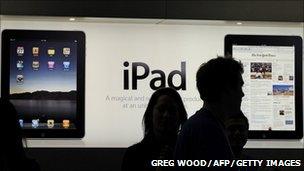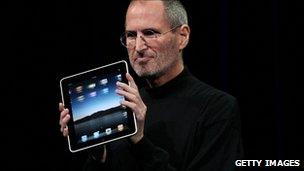Pressure mounts over Apple's 30% subscription charge
- Published

Publishers rushed to build apps for Apple's iPad
Pressure is mounting on Apple over subscription charges it plans to levy on some mobile content.
The company wants a 30% cut of payments for newspapers and other publications downloaded to its devices.
Anti-trust regulators in the US and Europe are reportedly poised to investigate the new pricing model.
Apple has defended the changes to its terms of business, saying the system is good for customers and will give publishers new opportunities.
Under Apple's plans, companies wanting to distribute their content to iOS devices - including the iPhone and iPad - would have to offer users the option of subscribing directly from their app.
One third of the selling price would then go to Apple.
Previously, users have been able to make their purchases through a web browser, effectively circumventing Apple, and handing all of the money to the publisher.
Including such web links within apps will be banned, from June 30th.
Angry publishers
The change has provoked widespread condemnation from content providers, who have called for an official investigation.
Following a meeting of around 60 European publishers on Thursday, the International Newspaper Marketing Association issued a statement warning: "publishers simply can't afford to invest in new technology, products and services when the platform charges them 30% of total revenue."
According to the Wall Street Journal, external, the United States Federal Trade Commission (FTC) is now examining whether Apple's plan breaches anti-trust rules.
If correct, those early stage anti-trust inquiries may not result in full investigations.
Apple has defended the new terms of business, saying that the retail model it offers is good for all concerned.

Apple said customer privacy is a key feature of subscriptions purchased through its App Store
In a statement, Apple's chief executive Steve Jobs said: "We believe that this innovative subscription service will provide publishers with a brand new opportunity to expand digital access to their content onto the iPad, iPod touch and iPhone."
However the company declined to comment directly on the publishers' criticism.
Fears are also being expressed that the charges will not be limited to newspaper and magazine subscriptions.
Apple has said that the 30% figure will apply to all in-app subscriptions.
They would mean the likes of Spotify, whose current app lets users launch a browser window to become new subscribers, would lose a large portion of its mobile revenue.
Steve Purdham, chief executive of UK-based music streaming service, We7, said he would welcome Apple providing the billing service for its apps and it should be able to charge for that.
But at 30% "we would be losing money on every subscription," he told BBC News.
"Taking a 30% toll amounts to a massive increase in the cost basis of a content business that will kill it," said James McQuivey, an analyst with Forrester Research.
Ultimately, Apple has the entire media business in its sights, he said.
Media control
"In the end, Apple envisions a world in which people don't consume any kind of digital media without its help," added Mr McQuivey.
He said that the charges are likely to encourage publishers on to other platforms.
One such alternative comes from Google, which also produces operating systems for smartphones and tablet computers.
Its recently announced One Pass payment system for magazine and newspapers charges a 10% fee, undercutting Apple.
One Pass also gives publishers greater freedom to offer different deals though different channels and to maintain a close relationship with their subscribers.
"You've got a very publisher-friendly approach; we basically don't make any money on this," Eric Schmidt, Google's chief executive said.
"The most important thing is to get the money to people who are producing high-quality content".
Google's cut was simply to cover its costs, Mr Schmidt added.
Warning shot
Even that lower figure may be too much for subscription services, said Mr McQuivey.
"The 10% number is a shot across Apple's bow, but it's still not low enough to sustain the market," he told BBC News.
A more realistic level would be on a par with the rates credit card processing companies charge, he added.
But both Apple and Google could be in for a shock, according to Mr McQuivey.
Media firms may give up on the app-based model of distributing content in favour of a new breed of web-based services, he said.
"It's going to be a pain, but everyone can now clearly see that in an HTML5 world, they won't have to pay taxes every single time they deliver value to consumers," he added.
- Published16 February 2011
- Published8 February 2011